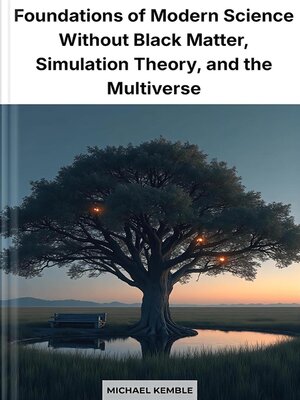Foundations of Modern Science Without Black Matter, Simulation Theory, and the Multiverse
ebook
By Michael Kemble

Sign up to save your library
With an OverDrive account, you can save your favorite libraries for at-a-glance information about availability. Find out more about OverDrive accounts.
Find this title in Libby, the library reading app by OverDrive.



Search for a digital library with this title
Title found at these libraries:
| Library Name | Distance |
|---|---|
| Loading... |
In a world increasingly dominated by abstract theories and speculative realities, what happens to our understanding of life when we strip away the concepts of black matter, simulation theory, and the multiverse? "Foundations of Modern Science without Black Matter, Simulation Theory, and the Multiverse" delves into these profound questions, challenging readers to reconsider how such notions can obscure the true value of lived experience. This book not only critiques the allure of these scientific paradigms but also provides a philosophical framework for appreciating the tangible and meaningful aspects of existence through the lens of the hidden sphere.
The relevance of this exploration is paramount in today's society, where scientific discourse often prioritizes theoretical constructs over practical implications. The central purpose of this book is to guide readers—scientists, philosophers, and curious minds alike—through an intricate examination of how contemporary scientific narratives may detract from our appreciation for real life. By engaging with historical insights and current trends, this work aims to illuminate pathways toward a more grounded understanding of existence that resonates with both intellectual rigor and emotional depth.
As we navigate through complex themes such as the absence of black matter in cosmology or the seductive nature of simulation theory, this book offers well-founded analyses backed by reliable data. It connects these ideas to broader societal contexts—examining how they influence cultural perceptions and personal identities in an age where virtual experiences are often prioritized over authentic ones. In doing so, it reflects on how humanity's quest for knowledge must be balanced with an appreciation for tangible reality.
This work presents unique insights that differentiate it from existing literature. Rather than merely critiquing popular scientific theories, it invites readers to engage with innovative methodologies that challenge conventional wisdom. Through interdisciplinary connections between philosophy and science, "Foundations of Modern Science" emphasizes how understanding our universe should not come at the expense of undervaluing our human experience.
In its concluding sections, the book reinforces its contributions by emphasizing that readers will emerge with a deeper comprehension not only of scientific principles but also their implications for everyday life. It advocates for a philosophical engagement with science that respects both empirical inquiry and personal significance—a vital perspective in an era characterized by rapid technological advancement and existential questioning.
By weaving together rigorous analysis with accessible language and relatable examples, "Foundations of Modern Science without Black Matter" is poised to resonate deeply within its target audience. Readers will find themselves equipped not just with knowledge but also with a renewed appreciation for what it means to live authentically in a world filled with uncertainty. This book promises to be an essential resource for anyone seeking clarity amidst complexity while encouraging a more profound connection to reality itself.







